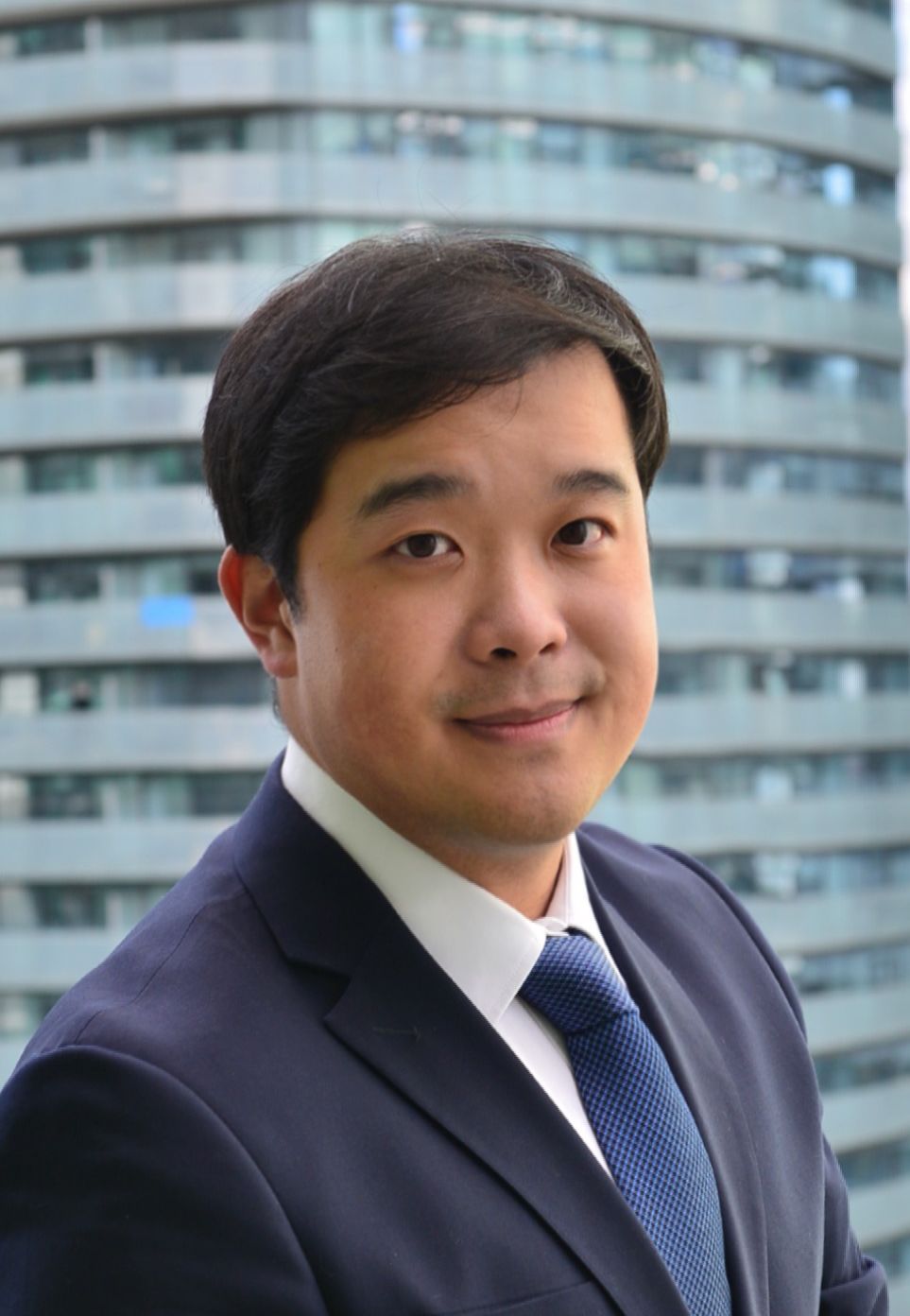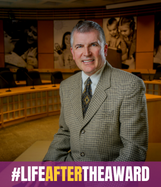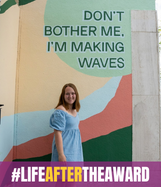By Maya Victoria Rojas
Feature image: Courtesy of Kyle Payne
Kyle Payne (Bronze ’12, Silver ’12, Gold ’14) completed all three levels of the Award through his cadet unit in Lindsay, Ontario and since then, he continues to give back to the community through volunteering.
A part-time reservist with the Canadian Armed Forces and a full-time municipal law enforcement in Peterborough, he also volunteers with St. John Ambulance as a medical first-aid responder and conducts simulation trainings with his colleagues.
Childhood memories that shaped Kyle’s life
Kyle remembers his teenage years fondly, particularly when he was earning his Gold Award.
“One day, we were up at 4:30 in the morning. It was a five-kilometre hike out of our campsite to pick up our bikes. We biked for 60 kilometers from 7:00AM to 4:00PM. Later, we did white water canoeing with Class II and III rapids, navigating 32 kilometers,” Kyle proudly explains, reminiscing about his trip to the Algonquin forest in 2013.
He was one of 30 people in a platoon participating in their Army Cadet Expedition Program. The group had such a rewarding journey that they extended it to five days of biking, four days of canoeing, four days of hiking and lots of camping in-between.
In total, they spent about two and a half weeks in the forest, carrying nothing but some food, water, sunscreen, and basic clothing, all in a three-litre bag. They swam in the lake and had their showers at the side of the road. Just young kids having the time of their lives.

Kyle (back, fourth from the left) and other cadets pose in front of Dyte Hall in Borden, Ontario. (Courtesy of Kyle Payne)
Being on this expedition with other young people became one of Kyle’s treasured childhood memories. It was by chance that he joined it. “We didn’t really camp as a family,” Kyle explains.
He shares that he initially applied to go to the marksmanship camp for the summer but received a message from his cadet instructor telling him that he should participate in the expedition program instead.
“I don’t even remember the last time I’ve been camping; I didn’t know what it was like. But [it] was a big eye-opener for me.” Kyle mentions, reflecting on his camping experiences 11 years ago.
Kyle and his three siblings were raised by his stepfather, a single parent. Going through the Cadet program and the expedition led him to meet other kids who were also facing tumultuous situations and challenges at home. “It’s kind of nice to realize that I’m not the only one.”
Finding purpose with volunteerism
Kyle’s involvement with the Award led him to volunteer with the Royal Canadian Legion. He helped as a staff during dinner banquets when the Legion had events and he met different kinds of people from different walks of life.
“I absolutely fell in love with it. I just loved helping people, giving back, and just being involved. I don’t know how to describe it. It’s just general enjoyment and happiness of being there to help others. You’re not getting anything back and there’s nothing expected of you”, Kyle says.
As Kyle found his community and connected with other volunteers who were in the Award and other organizations, the more he realized he was on the right path towards what he wanted to do in his life.
One of the officers at his cadet program worked as a first-aid instructor. At the time, they needed help with first-aid classes so they asked for volunteers to act as patients with casualties that the trainees would assess and treat. Kyle jumped in, exposing himself to the world of emergency medical care.
“While I’m lying there as the casualty, I thought that it might be really good to try out as a [more consistent] volunteer.” And so he did. He achieved his Standard First Aid Certification in 2011 in Cadets and has continued to maintain this certification today.
Navigating crises in medical emergencies
Just when Kyle finished his studies in university, the pandemic happened. He was working as a security guard in the emergency department of a hospital and the onset of the pandemic took an emotional toll on many, especially frontliners like Kyle who witnessed a lot of suffering and loss.
Aside from the COVID-19 virus, Kyle was constantly exposed to physical injuries and people requiring first-aid treatment, but he didn’t mind. He knew that he could do more, and he still had the desire to help people.

Volunteer medical first responders like Kyle (right), provide emergency first aid in many community settings. (Courtesy of Kyle Payne)
“During that time, I provided a lot of emergency first-aid treatment. There were a lot of stabbings, overdoses, domestic assaults, and people coming in off the street,” he says.
This was when he thought about volunteering as a medical first-aid responder with St. John Ambulance. While volunteering with St. John Ambulance, Kyle found his previous experiences reconnected him with people he met before.
“To see all these people that I knew, from all these different careers and all these different circles, kind of convening to the same spot, I thought, okay, obviously I’m meant to be here!” Kyle reflects.
This made him feel like he was destined to be involved with the organization, and to assist them during this challenging time couldn’t have been more fitting.

Kyle’s goal is to grow the number of volunteers for St. John Ambulance in the Kawartha Lakes area. (Courtesy of Kyle Payne)
From his experience as a security guard in the emergency room, he has friends who are paramedics. He saw their day-to-day experiences and he recognized how burned out they were. As someone who knows that they could offer more help, Kyle recognized how St. John Ambulance could be helpful in relieving the strained healthcare staff.
Kyle recalls one event, facing 13 casualties. Had St. John Ambulance volunteers not been present, these 13 people would have likely gone to an emergency room or clinic. Because the volunteers were able to assess and treat simple injuries, only two people needed to go to the hospital for stitches.
It might not seem much, but the work of St. John Ambulance can help reduce the workload for healthcare workers.
Empathy and discipline at work
The years that Kyle spent as security personnel at a hospital and as a volunteer with St. John Ambulance opened his eyes to many things.
“It’s a very high-stress, intense situation. You need to have effective communication.”
Kyle mentions how important problem-solving is but the greatest thing that he learned from his experience is how to interact with people calmly in high stress environments. Even when the goal is to give first-aid treatment to a patient, he must consider the mental toll of the traumatic event for the patient and show empathy while approaching the person calmly and carefully.
“The bedside manner of being able to hold a conversation with the patient and not freak them out, not show how stressed you are inside, that’s really the key,” Kyle explains.
He also connects this learning with his other experiences. “As an Officer in the Canadian Armed Forces, I can’t lose my cool in a high-stress situation. Otherwise, the whole team would lose their cool. I learned how to keep my composure.”
In his role as a security instructor where he taught trainees how to use handcuffs, part of the training was to tell the trainees that in the time they will use these skills, they won’t turn into superbeings. In fact, it’s more likely that their dexterity and motor function will decrease.
“Get the techniques right because in a high-stress situation you’re going to remember this using your muscle memory. You don’t rise to the occasion, you sink to your training,” Kyle says.
Guiding the youth through education
Having faced numerous challenges and adversity in his life, Kyle still manages to give back. His resilience and training have shaped him to become the person that he is today, but he doesn’t stop there. Whatever role or phase is in life, if he can help, he will.
Reflecting on his journey to attain his Gold Award, Kyle recalls a special moment where he had hurt his knee and had to do light duties for three days, but upon hearing about a young cadet in the basic expedition who was struggling to ride a bicycle, he felt compelled to help.
He approached her and learned she didn’t have a bicycle, nor could her parents teach her how to ride one. That’s when he decided to dedicate his three days to teaching her how to ride a bike. “By the end of the three days, she was able to ride. Seeing her finally get it and let go of the seat, it was enough to make me cry. It was phenomenal.”
Telling this story leads Kyle to describe a core memory, the day he got his bike from a Tim Horton’s Earn a Bike Program. He worked 40 hours of community service to receive a bike. “Having a bike was a luxury… it was the best day of my life, getting my own bicycle that wasn’t a hand-me-down or bought second-hand and all rusted.”
“Being able to see someone else enjoy learning how to ride a bike was kind of like a full circle for me,” Kyle says. “The following summer, I was in my first year as an adult staff. I was teaching survival and I saw her riding a bike. She came running over afterwards and thanked me.”
As a kid who lived in cooperative housing and only had one parent raising him and his three other siblings, Kyle also shared that they took part in the breakfast program at school. He was always around volunteers who helped kids like him.
“Now, it’s my turn. I can give back to somebody else. It’s my opportunity now to pave the way for the next generation of people who are experiencing those issues.”
Inspiring and giving hope to the next generation
Going back to Kyle’s childhood, he recalls why he joined the Award in the first place.
“I joined the Award after my platoon commander delivered a presentation and highlighted the benefits of the Award. I completed my Bronze after my first summer at a Cadet Training Centre and loved the additional challenge it brought. After that, I continued the Award to seek that additional challenge. To this day, I am always looking for ways to improve my skills and challenge myself.”
Kyle’s upbringing may have been marked by hardship, yet he refused to let his circumstances define his character. Instead, he draws strength from his experiences to fuel his desire to help others. Kyle shares his story because he wants to empower the youth and let them know that they are not alone in their struggles.
Today, Kyle is an outstanding individual and proud Award Holder. Through the Award, he was able to shape his character and outlook in life. He gained resilience, perseverance, and a sense of responsibility. Instilled in him is a commitment of serving his community and guiding more young people to also become #WorldReady.
Share this...
More Stories Like This






